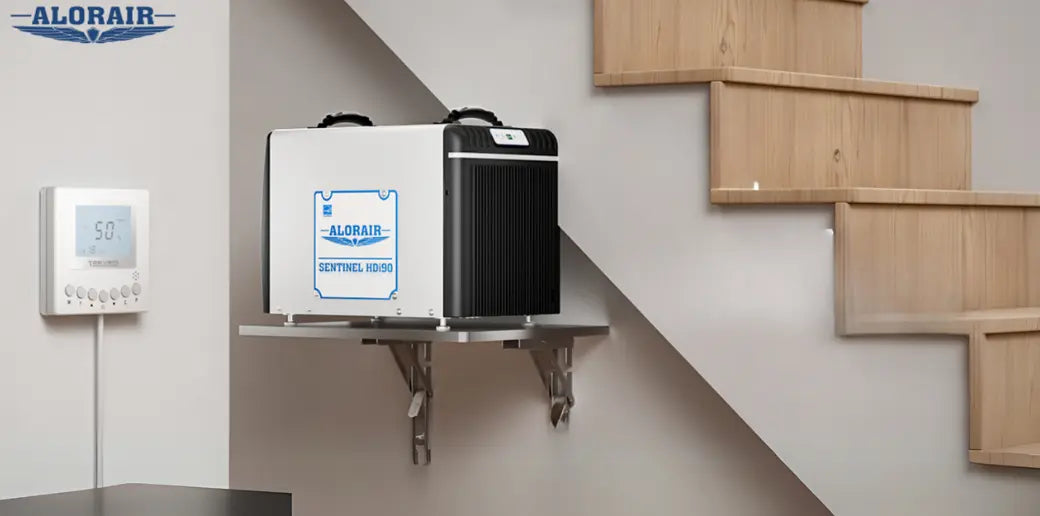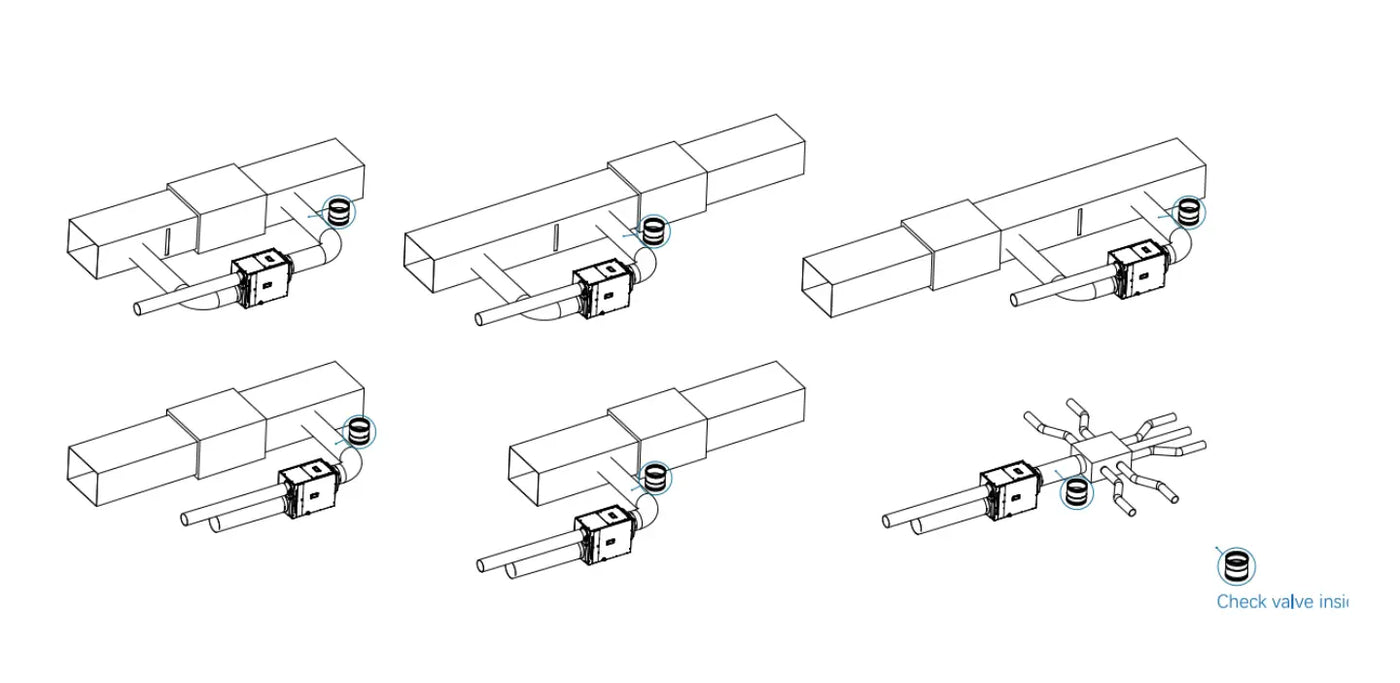Yes, a dehumidifier positioned in the basement will improve your home's moisture content, although the effect remains limited. The natural upward flow of damp air enables basement humidity control to potentially lower moisture levels on higher floors. A dehumidifier placed in the basement becomes effective at reducing moisture when the basement produces significant dampness, while the house maintains good airflow.
The limiting factor for your basement's impact depends on whether it stays sealed off or has bad ventilation. When the basement or crawlspace dehumidifier cannot manage humidity in the upper parts of your home, it can still help with mold prevention and localized comfort. Multiple-area humidity control demands a centralized solution that should be implemented for homes with persistent moisture challenges.
Why Moisture Starts in the Basement

The combination of inadequate ventilation, low temperatures, and ground moisture leads to high humidity in basements. Warm air naturally rises toward the ceiling while cool air drops, creating basements, which are the final destination for home moisture accumulation. Moisture enters buildings through foundation walls and floors, and condensation develops from pipes or appliances.
The humidity in these areas travels through building openings to reach different floors, which leads to degraded air quality in the entire home. The air quality inside your basement influences the quality of the whole home, though you may only visit the area occasionally. A basement dehumidifier effectively tackles moisture at its origin, stopping mold growth and odors and protecting home structures.
The Role of Air Circulation in Whole House Impact
A basement dehumidifier needs proper airflow to reach the entire house. A properly-sized basement dehumidifier can work through the entire house when it connects to main floor areas or if your HVAC system draws air from the basement space. A dehumidifier in this situation delivers limited results unless there is sufficient ventilation between the basement and upper levels.
A dehumidifier operating in an enclosed basement area primarily affects the air quality within that room. A system designed to control humidity in bedrooms, kitchens, and living rooms needs to treat air throughout the entire house.
The placement of fans near stairwells, along with opening interior doors, helps improve ventilation between basement areas and other floors. The method typically fails to achieve desired results within extensive or multilevel residential buildings.
When Is a Basement Unit Enough?
A basement dehumidifier provides an effective solution when these conditions apply:
-
The basement remains the largest source of moisture problems throughout your home.
-
A dehumidifier is beneficial when you need regular access to your basement due to laundry needs, storage requirements, or finished living spaces.
-
Most areas of the house remain dry.
-
Your goal is to stop mold growth and unpleasant odors from forming in one specific room or area.
-
An open floor layout and powerful air circulation between different levels exist in your home.
A high-capacity basement dehumidifier equipped with a drain hose works best in this case. These products operate effectively in limited spaces despite daily handling of substantial moisture.
When You Need a Central or Whole House Solution

A basement unit will not adequately reduce excessive humidity spread throughout multiple rooms, which causes humid smells or discomfort. Modern homes require central dehumidifiers since they provide superior performance. These devices operate to drain moisture from the entire home beyond a single space.
These devices integrate into your HVAC system to take air through the ducts before heating or cooling distribution. The system provides equal humidity regulation throughout your entire house, from the basement to the highest level.
Comparing Costs: Basement vs. Whole House Systems
When comparing cost-effectiveness between basement-specific and whole-building wetness management systems
Basic basement dehumidifiers available on the market cost from $800 to $1,500, depending on size and additional features included. A one-room solution functions through simple installation and requires minimal labor costs. This option represents an excellent solution for budget-friendly users who need to address specific localized moisture problems.
A full central dehumidifier delivers broad humid air coverage at a higher price point than other options. Reviewing the complete whole house dehumidifier cost will help you understand extended benefits and financial savings.
Baseboard dehumidifier systems might need ongoing fan replacements or upkeep, but central units deliver both effortless operation and high performance after installation.
Installation Considerations
You can install a standalone basement or crawlspace dehumidification system at a lower cost than building an HVAC-based system. The units function either by draining through floor drains or connecting to hose systems. Your basement arrangement might require that you lift the unit to make gravity drainage possible.
Advanced home systems with whole house dehumidifiers normally require professional help for ductwork modifications and electrical wiring installation. Professional assistance leads to improved long-term solutions while implementing this system.
Select an installation position according to your home design and the areas where moisture occurs, together with your desired coverage scope.
Maintenance and Longevity
The maintenance requirements for basement units are minimal. You’ll need to:
-
The filter requires either cleaning or replacement once every 2–3 months.
-
Examine the drain hose for any blockages or leakage points.
-
Check coils to verify their cleanliness from mold or accumulated dust.
-
Regularly check your home’s humidity levels by using either a digital display or a hygrometer.
Taking good care of your dehumidifier promotes its smooth operation and extends its lifespan. Quality units featuring proper maintenance can operate efficiently for 5 to 10 years.
A professional HVAC technician should perform annual maintenance examinations on central systems, while hands-on maintenance is required less frequently.
How to Decide What’s Best for Your Home
Here’s a quick comparison to help you choose:
|
Feature |
Basement Dehumidifier |
Central Dehumidifier |
|
Coverage |
Basement and nearby areas |
Entire house |
|
Cost |
Lower upfront |
Higher investment |
|
Installation |
Simple, often DIY |
Professional recommended |
|
Air Circulation |
Depends on the home layout |
Built into the HVAC system |
|
Best For |
Localized moisture, smaller homes |
Full-house comfort, large homes |
A quality crawlspace dehumidifier could be your best solution when your main moisture problems exist inside the basement. Your home requires a central system as your main humidifier system if you want a permanent solution that addresses moisture throughout your entire home.
Final Thoughts
An installed basement dehumidifier functions to reduce overall home moisture when your basement areas have open ventilation throughout the building. This product works effectively to manage local moisture problems and protect unfinished and finished basement areas.
Your decision to purchase a central dehumidifier becomes necessary when your house experiences extensive humidity problems and contains areas that are inaccessible to air circulation. This system develops uniform moisture management throughout all spaces of a house.












